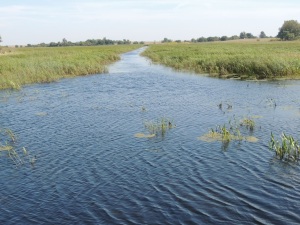
Federal funds may become available to add acreage to Dunbar Slough in Scranton and Willow Townships. Greene County conservation Dan Towers briefed the county supervisors Monday on a renewed effort to obtain national wildlife refuge designation for the wetlands.
According to Towers, county residents talked with Senators Chuck Grassley and Joni Ernst, and Representatives Steve King and David Young last week in Washington. All of them expressed interest in the designation, and Young said he would introduce the necessary legislation to make it happen.
Sen Tom Harkin introduced similar legislation before he left office a year ago. “It didn’t go anywhere, but it put it on the radar,” Towers said.
Dunbar Slough now covers 2,500 acres, an increase of 2,000 acres in the past 30 years. Some of it is designated as a state water fowl refuge. Towers explained that after the Prairie Pothole region was recognized in 1987, federal funds became available for land acquisition in wetlands in five states, including Iowa.
The land acquisition would be very slow and only as property began available for sale. Towers guessed it could take as long as 20 years to acquire another 2,500 acres. The designation would not require land to be sold, but only provide funding should a sale become possible.
He said that in the past four or five years, revenue from the federal duck stamp, a $7 fee collected from hunters from the U.S. Fish and Wildlife Service, has all gone to North and South Dakota. If Dunbar Slough has federal wildlife refuges designation, the money could be used for land acquisition.
The land is typically marginal as farm land and the existing lands have all been sold willingly, Towers said. The DNR has three property owners willing to sell land in the Dunbar Slough area, but funding isn’t available.
The Fish & Wildlife Service and the Iowa DNR make payments to counties to replace a portion of property taxes, Towers explained. The DNR now spends about $1 million a year paying taxes on lands purchased with REAP or Habitat funds. Tourism dollars generated by hunting more than offset any lost tax revenue, he said.
There are 5,800 acres of public land in Greene County, according to Towers. Of that, the county owns 2,000 acres and the DNR owns 3,800 acres. That total is less than 1 percent of the total area of the county. He said Iowa ranks 49th out of the 50 states in the amount of public land, with only Rhode Island trailing.
Towers has already talked with the Guthrie County supervisors about the national wildlife refuge designation. That group is supportive of the federal designation.
The supervisors will have on an upcoming agenda a letter of support for legislation for the legislation.
